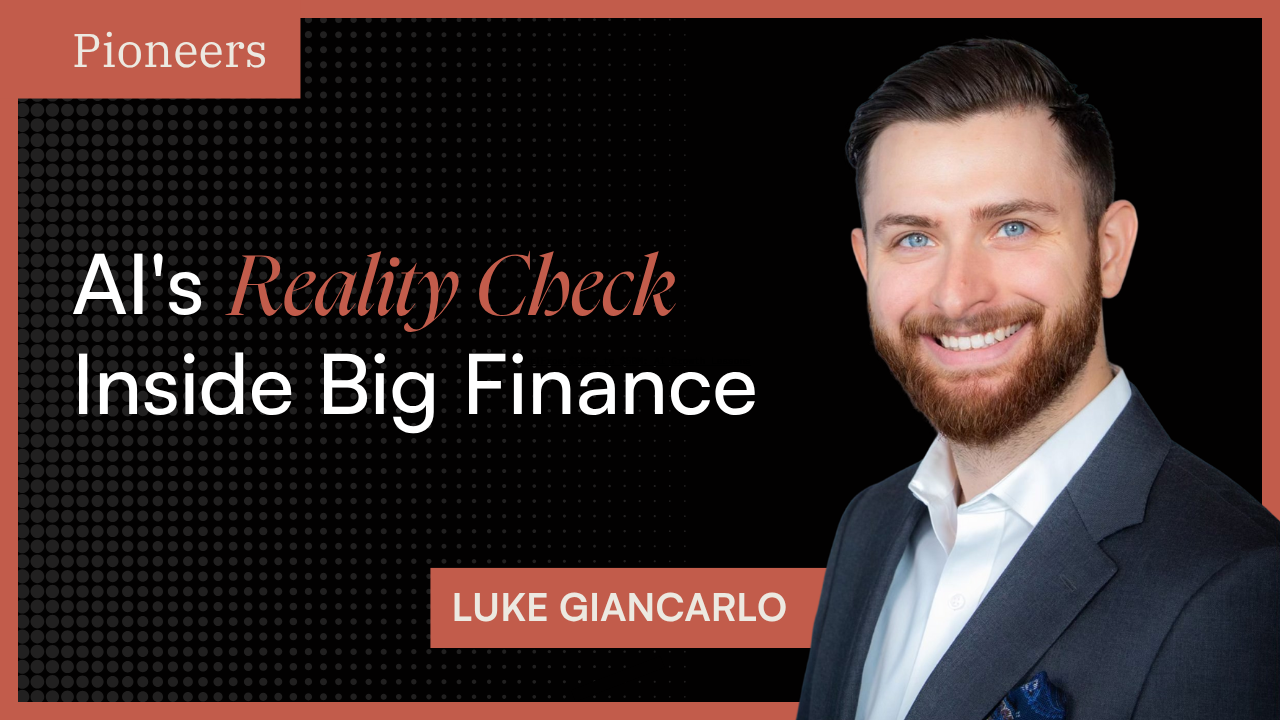This is a summary of an episode of Pioneers, an educational podcast on AI led by our founder. Join 3,600+ business leaders and AI enthusiasts and be the first to know when new episodes go live. Subscribe to our newsletter here.
TL;DR:
- Financial institutions are shifting from AI hype to execution, prioritizing internal efficiency and data governance over flashy consumer-facing use cases.
- “People don’t buy technology, they buy solutions.” Startups that clearly solve real problems: time, cost, compliance, stand out.
- Stablecoins like USDC are pushing banks to rethink payments, treasury, and deposit models, “the death of distance” is accelerating.
- Blockchain and AI are converging: “They’re almost a match made in heaven” when it comes to data tracking and provenance.
- Large FIs now resemble tech companies, but speed still gives startups the edge, especially when solving niche pain points faster.
Before we dive into the key takeaways from this episode, be sure to catch the full episode here:
Meet Luke - Director at Accenture's Fintech Innovation Lab
Luke Giancarlo is Director of the FinTech Innovation Lab at Accenture, where he helps global financial institutions navigate and adopt frontier technologies.
Luke has worked across innovation waves, from blockchain to AI to quantum, building partnerships between startups and tier-one banks, insurers, and payments giants.
He previously helped lead the Digital Dollar Project and piloted the first tokenized settlement trial with DTCC, pioneering secure blockchain-based infrastructure for capital markets.
At the Lab, Luke curates each year’s cohort based on real innovation priorities voiced by financial institutions, connecting founders to decision-makers and translating buzzwords into bankable solutions.
A passionate fintech operator, Luke believes “startups win when they sharpen their edge and solve real business problems—not just sell tech.”
From Buzzword to Business Value: The AI Shift in Financial Services
Financial institutions have shifted from AI experimentation to practical, internal deployment. “Last year, they all said we want to do AI everything,” says Luke Giancarlo.
“A year later, they came back and said, okay, this is really hard to do.” Institutions are realizing the need to first fix data management, security, and risk protocols before deploying AI at scale. Many have paused consumer-facing AI to focus on operational efficiency, applying AI in employee workflows instead.
“AI built on bad data is just bad AI,” Luke recalls hearing from a client. The result is a more sober, realistic approach that focuses less on flashy pilots and more on foundational readiness.
Today’s AI adoption is no longer about novelty but about business value and internal transformation.
“We actually don’t want any AI interacting with our customer base. We’re first going to test it out on ourselves internally.” — Luke Giancarlo
Why Startups Win When They Solve Specific Problems
Startups break through in financial services not by pitching technology, but by solving real business pain. “People don’t buy technology.
They buy solutions,” says Luke. The startups that rise above the noise are the ones that articulate a clear business problem and show how their product reduces cost, time, or risk. With hundreds of AI vendors pitching similar features, clarity around ROI becomes the differentiator.
“There’s a lot of great technology out there, but if you can really solve a problem, that’s what sets you apart,” — Luke Giancarlo.
Buyers are not looking for generalized AI, they are looking for domain-specific edge.
Founders who show they understand industry workflows and constraints are more likely to be taken seriously by sophisticated enterprise buyers.
The ‘Death of Distance’ and the Future of Payments
Stablecoins and blockchain are rewriting the rules of global finance. “With stablecoins, you can go directly from point A to point Z without all the steps in the middle,” Luke explains.
This shift eliminates the need for complex reconciliation processes and legacy intermediaries. Accenture calls this the “death of distance,” where settlement becomes instantaneous and borderless. Financial institutions are increasingly pressured to define their role in this new model. “Phones are ringing off the hook,” says Luke.
“It’s absolutely going to be a hot topic alongside AI in the next year.” Treasury modernization and back-office systems must now evolve to match the speed of these payments. As stablecoins gain traction, institutions must adapt or risk falling behind the next wave of innovation.
AI and Blockchain: A Surprising Power Couple
AI and blockchain, once considered separate innovation tracks, are becoming deeply intertwined. “They’re almost a match made in heaven,” says Luke.
One of AI’s core challenges is data provenance: where data comes from, how it is handled, and whether it can be trusted. Blockchain’s strengths in immutable data records and audit trails make it an ideal companion to AI in regulated sectors. “If only we knew the provenance of the data,” Luke recalls hearing during strategy sessions.
“Well, there’s a fantastic technology out there… and it’s blockchain.” Use cases at the convergence include fraud detection, supply chain transparency, and model explainability. As enterprises begin to connect these dots, a new class of hybrid applications is emerging that offers both intelligence and traceability.
Inside the FinTech Innovation Lab: How Startups Gain an Edge
The FinTech Innovation Lab, run by Accenture and the Partnership Fund for New York City, gives startups direct access to senior stakeholders at tier-one financial institutions.
“We don’t take any equity, we don’t give any funding. Everyone’s giving something more precious, which is their time,” says Luke.
Startups receive candid feedback on their product, roadmap, and market fit. “You’re rated by those financial institutions and their executives,” Luke explains. “It’s levels of access that would be near impossible to get otherwise.”
The Lab focuses less on demo day theatrics and more on lasting relationships. “The 10 weeks are just to ramp you up. The real work happens afterward.”
For founders seeking to validate use cases and sharpen their value proposition, it is a proving ground like no other.
.svg)



.svg)
.svg)

.svg)
.png)
.png)
.png)
